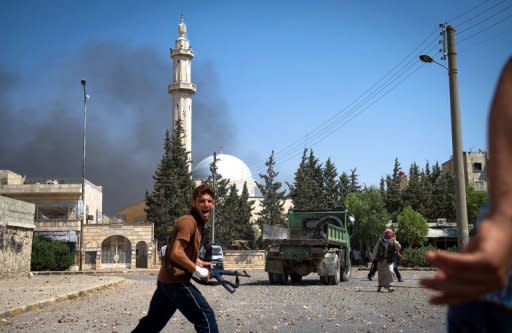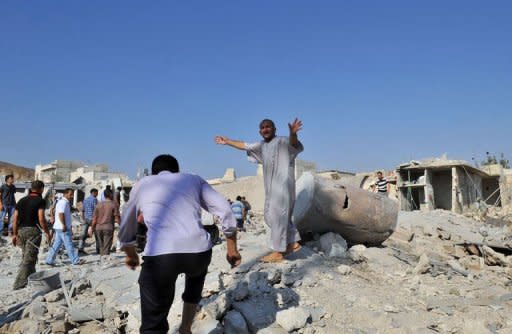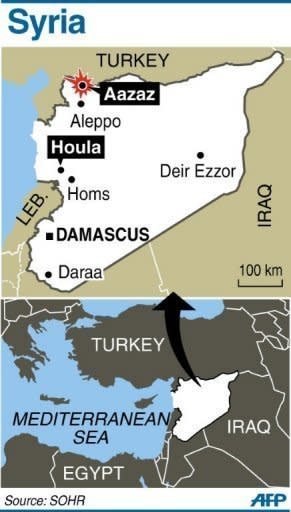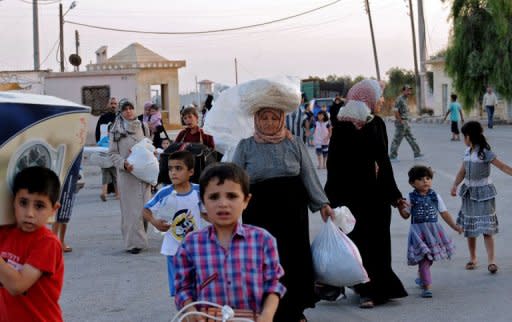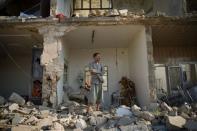Air strike as UN blames Syria for crimes against humanity
UN investigators said Wednesday the Syrian regime has committed crimes against humanity, including the Houla massacre, as two dozen people were reported killed in a devastating air strike. Regime forces were also bombarding the key battleground city of Aleppo in the north, activists said, while Damascus was shaken by a bomb attack targeting a military headquarters and a firefight near the prime minister's office. A report by the UN Commission of Inquiry said government forces and their militia allies committed crimes against humanity including murder and torture, while the rebels have also carried out war crimes, but on a lesser scale. The report was issued as pressure mounted on President Bashar al-Assad's embattled regime with the world's largest Muslim body poised to suspend Syria over the unrelenting violence, following a similar move by the Arab League. "The commission found reasonable grounds to believe that government forces and the shabiha had committed the crimes against humanity of murder and of torture, war crimes and gross violations of international human rights law and international humanitarian law," the UN report said. It said they were responsible for the massacre in the central city of Houla in May when 108 civilians, including 49 children, were killed in a grisly attack that Assad himself had said was the work of "monsters". Rebel fighters were however not spared in the probe, which found them guilty of war crimes, including murder, extrajudicial execution and torture. In the north of Syria, activists and residents reported another atrocity by the regime, with at least 31 people including children killed in an air strike in Aazaz, a rebel bastion near the second city Aleppo. "Bashar did this. God help us, these animals will kill us all," said one man, hoisting a bloodied arm from a pile of body parts on the pavement outside the local hospital. The Syrian Observatory for Human Rights said 31 people were killed, including women and children, and another 200 wounded, warning the toll could rise. "There are many people still trapped under the rubble," said Observatory director Rami Abdel Rahman. "The situation is horrific." Dozens of residents were seen fleeing for nearby Turkey, many of them entire families carrying boxes of clothing and food on their heads. In all at least 156 people were killed Wednesday in Syria, where more than 23,000 people have died since the uprising against the regime erupted in March 2011, said the Observatory. In Damascus, the FSA claimed a bomb attack targeting a military headquarters near a hotel used by UN observers, saying it was a warning that it could strike anytime at the very heart of the regime. In July, another attack also claimed by the FSA killed four top security chiefs in a major body blow to the regime. A gunbattle also erupted near the offices of new Prime Minister Wael al-Halqi, just a day after his predecessor Riad Hijab, the highest profile government figure to defect, said the regime had collapsed and only controlled 30 percent of the country. And in a worrying development in neighbouring Lebanon, rioters blocked roads and dozens of Syrians were kidnapped and their shops vandalised in violence that triggered orders from Gulf nations for citizens to leave immediately. Rioters set fire to tyres on the road to Beirut airport and closed the main highway to Syria after unconfirmed television reports said several Lebanese Shiite pilgrims kidnapped in Syria in May had been killed in the Aazaz attack. Saudi Arabia, the United Arab Emirates and Qatar all issued warnings for their nationals to leave because of what the UAE foreign minister said was a "very dangerous" situation. Violence in Syria has often spilled over into Lebanon, with cross-border shootings, shelling by the Syrian army, tit-for-tat kidnappings and sectarian clashes between groups divided over the revolt. UN humanitarian chief Valerie Amos, who is due in Beirut Thursday after visiting Damascus, warned that the situation in Syria was getting worse, with the number of people in need possibly as high as 2.5 million. In Mecca, the Organisation of Islamic Cooperation was set to follow the Arab League in suspending Syria in a move -- vehemently opposed by Iran -- which is aimed at further isolating Assad's regime but is seen as largely symbolic. A final draft statement says Syria should be suspended over "the obstinacy of the Syrian authorities in following the military option" and the failure of a peace plan brokered by outgoing international envoy Kofi Annan. Fresh comments by Russia, the US and China Wednesday also underlined the deepening rifts between world powers over how to tackle the conflict in the strategically vital Middle Eastern state. Russian Foreign Minister Sergei Lavrov accused Western states of fomenting violence by openly supporting the armed rebellion, comments rejected by the United States. China, which along with Russia has blocked three UN resolutions on Syria, also accused Western powers of hampering efforts to end the conflict, as a senior Damascus envoy visited Beijing for talks. And on Tuesday, US Defence Secretary Leon Panetta accused Iran's elite Revolutionary Guards of trying to develop a militia within Syria to fight for the regime.

